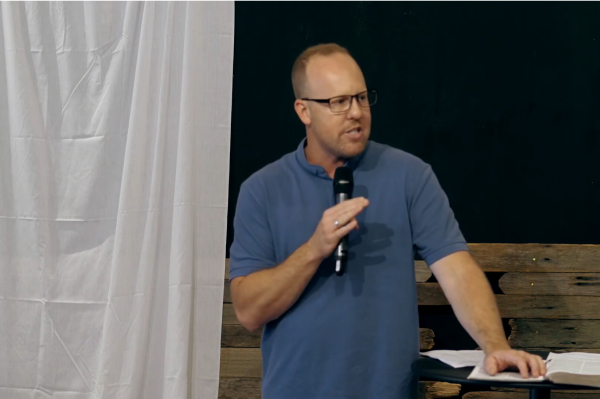When Bashing 'Fundamentalism' Misses the Mark

Most Christians these days tend to shy away from describing themselves as "fundamentalists." And can you blame them? The term has become loaded with baggage that few believers want to bring along on their spiritual journey to the promised land. Fundamentalists, after all, are those wild-eyed fanatics who shove their religion down the throat of anyone in their vicinity, right? Such people tend to be aggressive and intolerant.
But this is not how most Christians interact with others. While affirming the fundamentals of the Christian faith, the vast majority of believers wisely recognize that fanaticism only turns people off. It simply pushes unbelievers away from the very message powerful enough to bring lost people into a relationship with Christ.
It has wisely been noted, "It's one thing if the Gospel offends someone. It's another thing if you do."
This critical aspect of Gospel outreach motivates us to be winsome in our witness and gentle in our approach. We want to "always be prepared to give an answer to everyone who asks you to give the reason for the hope that you have. But do this with gentleness and respect." (1 Peter 3:15)
Thankfully, the Lord has raised up a number of tactful messengers in our day who are engaged in apologetics. These faithful witnesses have led many unbelievers to Christ by proclaiming the truth of Scripture and defending Christianity against various objections. This cadre of Spirit-led apologists includes men like John Lennox, Ravi Zacharias, Michael Brown, Norm Geisler, Josh and Sean McDowell, Lee Strobel, William Lane Craig, Frank Turek, Hank Hanegraaff, J. Warner Wallace and Gary Habermas.
None of these faithful apologists display fanaticism. On the contrary, these men are extremely qualified to present a clear and loving defense of the Christian faith. And they do so in a gracious manner and a cordial spirit.
With this in mind, I was intrigued by the titles and the content of a couple recent articles in The Christian Post writtenby a seminary professor from Canada. Dr. Randal Rauser penned: "Fundamentalist Apologetics Comes of Age," and "Top 5 Problems With Contemporary Christian Apologetics." Rauser takes particular aim at Josh McDowell's classic apologetic manual, Evidence That Demands a Verdict.
Among his various concerns, Professor Rauser addresses what he calls "the fundamentalist commitment to tract-based conversionist evangelism." Now this is truly a puzzling criticism. After all, the goal of evangelism for 2000 years has been to lead people to Christ. Jesus and the apostles preached repentance and faith for the forgiveness of sins. They were completely committed to spiritual conversion because it is the only way a person can be saved, redeemed, born again, forgiven and justified.
Professor Rauser correctly identifies the false notion that a believer must be able to pinpoint the day he or she was converted. The fact of the matter is that many born again people cannot tell you exactly when they were converted. At the same time, it is terribly misguided to paint faithful apologists with the "fundamentalist" brush and to criticize "tract-based conversionist evangelism." Simply put, it sends the wrong message.
After all, many people have been converted when reading the good news in a Gospel tract or responding immediately to the message of Law and Gospel given by a Christian evangelist, pastor, or apologist. And the Lord was definitely preaching for conversion when He proclaimed in His first sermon, "Repent and believe the good news." (Mark 1:15)
Rauser's loose and incomplete references to the biblical teaching of conversion seem connected to something he wrote in his latest article: "I converted at the age of five after my mom confronted me with the bald choice to follow God or the devil." Where is the Gospel in this personal reference to his "conversion"?
Even if we give him the benefit of the doubt on this curious wording that implies he basically converted himself, where is the meat and the follow-up describing what the Bible actually teaches concerning the supernatural miracle of conversion? After choosing to raise the critical issue of conversion, the seminary professor leaves us with nothing more than, "I converted..."
This lack of theological depth makes it even more stunning that Rauser would take issue with Josh McDowell's apologetics. Rauser's explanation of conversion and the atonement are devoid of any real substance. And rather than affirming and unpacking the biblical teaching on these core issues, he merely presents a few personal anecdotes that glibly gloss over some of the most critical issues of our Christian faith.
Perhaps Rauser's main goal in writing these articles was to attach the "fundamentalist" label to faithful Christian messengers like Josh McDowell. A major problem of course with using the "fundamentalist" label to describe Christ-centered evangelistic efforts is that it fits the false narrative being promoted in various mainline denominations today.
The denominations that have fallen into the abyss of spiritual confusion didn't get there by sticking to the fundamentals of Christianity. Instead, certain professors at their seminaries were seduced into thinking that the old doctrines concerning Scripture, the cross and salvation are merely "theories" that need to be revisited today in the light of a newfangled and progressive agenda.
There are those who say, "Why preach for conversion when most if not all people are already on the path to heaven?" Sadly, the false doctrine of universalism is rampant these days. And in light of all the other doctrinal errors being taught by religious leaders who have forsaken Scripture, it is odd that Professor Rauser directs so much "friendly fire" at certain Christian apologists who have been faithful to Scripture while diligently serving on the frontline for decades.
That's not to say correction is never needed in the ministries of Christian evangelists, pastors, teachers and apologists. But theological and spiritual correction requires accurate discernment, as well as the counsel of wise and mature believers. Otherwise, we are prone to "go it alone" and assume that our perception is vastly superior to those who have faithfully gone before us.
A good example of such lone ranger analysis is when Professor Rauser writes, "Fundamentalist apologists have a very bad history of naively proof texting biblical prophecies to establish allegedly rationally compelling evidence for the supernatural origins of the Bible."
Really? A bad history of pointing to the Lord's prophetic Word to substantiate God's one and only plan of salvation?
If the fulfilled Messianic prophecies are not supernatural and overwhelming evidence that demands a verdict concerning Christ, then what are they? The fulfilled prophecies are definitely rock-solid proof that only God could have given us the Old Testament, the New Testament, and the free gift of eternal life in paradise through faith in the Messiah. (I addressed the issue of the fulfilled prophecies in an article 5 years ago entitled, "The Mathematical Proof for Christianity Is Irrefutable," as well as a Kindle ebook with the same title.)
Highlighting the fulfilled Messianic prophecies is perfectly consistent with an accurate presentation of Scripture, while downplaying the prophecies minimizes the supernatural reality of the Bible. And it distracts from the supernatural power of the Messiah. The bottom line is that the fulfilled prophecies in Scripture are indeed compelling evidence for the supernatural origins of the Bible. And those who deny this simple fact of history completely miss a major work of the Holy Spirit who put an exclamation mark on God's beautiful plan of salvation in Christ alone.
Interestingly, there is not another "holy book" on the planet with even one fulfilled prophecy pertaining to its prophet and its purported path to paradise. Compare the lack of evidence in those religious books to the biblical prophecies of the Bible. Peter wrote, "Above all, you must understand that no prophecy of Scripture came about by the prophet's own interpretation. For prophecy never had its origin in the will of man, but men spoke from God as they were carried along by the Holy Spirit." (2 Peter 1:20,21) God certainly wanted us to know beyond a shadow of a doubt that "all Scripture is God-breathed." (2 Tim. 3:16)
Who else could have directed things over many centuries to bring about the fulfillment of the Old Testament prophecies concerning the coming Messiah? Mere mortals could not have even come close to bringing about "the plan of Him who works out everything in conformity with the purpose of His will." (Eph. 1:11) The fulfilled prophecies within Scripture absolutely authenticate the message God decided to give us in His love letter known as the Bible.
Rather than affirming and celebrating this mind-boggling evidence that was graciously given to us by our Creator, Professor Rauser finds himself moving in a different direction with a alternate agenda. He feels that "fundamentalism" leads certain Christian apologists to end up with what he calls "a tendentious understanding of 'biblical inerrancy,' a skepticism of evolution and contemporary science, a simplistic soteriological exclusivism, a single theory of atonement (penal substitution) and posthumous judgment (eternal conscious torment), and so on." Rauser seems to be strongly opposed to what he calls a "narrow understanding of the Christian tradition."
So what is the most popular alternative these days to this narrow road and these traditional beliefs? Well, there are plenty of religious leaders today who reject the fact that the Bible is God-breathed and without error, and who teach that man evolved from monkeys. They claim that the gift of salvation is not exclusive to Jesus and His followers, but instead gets bestowed upon all sincere religious seekers even if they reject Christ. And they say the atoning work of Jesus on the cross is not essentially about the Lord bearing the punishment for man's sin as our substitute. Many of these religious teachers also present heaven and hell in moderate terms, or they simply ignore these extreme eternal destinations which Jesus spoke about on many occasions.
And what is the result of such alterations to God's Word? It is not good. Do counterfeit doctrines that contradict Scripture have the supernatural power to lead even one soul into Christ's kingdom? Far from it. Do such empty musings have the power to convert even one soul? Not at all. Therefore, the Holy Spirit will never lead a person to doubt the authority, truthfulness and infallibility of Scripture.
Few if any Christian apologists frame the biblical and historical evidence the way Professor Rauser has framed it in his recent articles. It is one thing to bash fanaticism, but it is quite another to paint reputable Christian apologists with the "fundamentalist" brush; while chipping away at biblical inerrancy, interjecting confusion into the uncomplicated doctrine of the atonement, downplaying the enormous significance of the fulfilled Messianic prophecies, and minimizing the clear biblical teaching concerning eternal torment in hell and everlasting joy in heaven.
Those who chip away at these biblical doctrines (intentionally or not) do nothing to weaken the faith of those who are strong in the Lord and strong in the Word. But unfortunately, it does harm those who are weak in faith and shaky in their belief in the Bible as the infallible Word of God. Therefore, the apostle Paul instructed Timothy: "Watch your life and doctrine closely. Persevere in them, because if you do, you will save both yourself and your hearers." (1 Tim. 4:16)
Rauser feels "the biggest problem" in contemporary Christian apologetics is "fundamentalism," and the first characteristic this professor lists to "define fundamentalism" is "biblicism." Rauser understands biblicism to involve "a high regard for the Bible and its unique authority in conveying spiritual truth," which helps to explain why he takes issue with Christian apologists like Josh McDowell who demonstrate such a high regard for Scripture.
Regarding the original manuscripts of the Bible, Rauser writes: "And we know that these copies have some errors because they differ at various points with each other." Rauser conveniently leaves out the fact that "for more than two centuries, most biblical scholars have declared that no essential affirmation has been affected by the variants." This is a huge distinction that Rauser simply seems to ignore, leaving his readers to wonder about the "errors" that he claims are in the Bible. If you would like to know the truth about the original manuscripts of the Bible, check out: "An Interview with Daniel B. Wallace on the New Testament Manuscripts." (Wallace started the Center for the Study of New Testament Manuscripts in 2002, and he has debated Bart Ehrman a number of times.)
Rauser's latest article has taken aim yet again at the "theory" of penal substitution atonement. He seems to believe a different "theory" of the atonement is needed. While progressives love to use the word "theory" when discussing the sacrificial death Jesus endured for sinners on the cross, Isaiah wasn't presenting a theory when he wrote, "The punishment that brought us peace was upon Him." (Isaiah 53:5) And Peter wasn't presenting a theory when he wrote, "Christ died for sins once for all, the righteous for the unrighteous, to bring you to God. (1 Peter 3:18) And Paul wasn't presenting a theory when he wrote, "Christ was delivered over to death for our sins and was raised to life for our justification." (Romans 4:25) You see, the biblical teaching of penal substitution atonement is not in conflict with this fact: "God so loved the world that He gave His one and only Son." (John 3:16)
Professor Rauser wrote an article earlier this year entitled, "If God Wants Us to Be Saved, Why Isn't Salvation Simple?" Rather than landing on the simple explanation of how a person is converted through repentance and faith in Christ, Rauser gets detoured on tangents related to the question, "Precisely what do you need to believe (and not believe) in order to be saved?"
In contrast, most effective evangelists, pastors, teachers and apologists over the centuries have presented the crystal clear message of salvation, while at the same time addressing the various false doctrines that arise whenever God's Word is twisted and distorted to say something very different than what is actually taught in the Bible.
Oswald Chambers authored "the most beloved devotional book of all time": My Utmost for His Highest. In it he writes, "The reason it is so easy to obtain salvation is because it cost God so much."
Once we find ourself in the grip of the Gospel, we bask in the freedom and the simplicity of the message. And we are less likely to bash the approach of faithful messengers on the frontline of evangelism and discipleship in the world today. But if we make things complicated in our mind and get away from the simplicity and power of the good news, we can easily end up engaging in much "friendly fire" against those who are accurately defending the faith and reaching the lost for Christ.
We will only become balanced and mature teachers of the Word when we rely upon the Holy Spirit to teach us true doctrine, and to guide us in the appropriate way to respond to perceived errors. Sometimes we hit the nail on the head, and other times we miss the mark because we are flawed human beings. It is only the grace and wisdom of God that is able to keep us from making a mess of things.
And while we can and should address objections to Christianity, we cannot argue or debate anyone into trusting Christ as Savior. It is only the good news of "the Gospel that is the power of God for the salvation of everyone who believes." (Rom. 1:16) We must rely heavily upon the power of the Gospel and the power of the Holy Spirit to bring about the miracle of the new birth in a human soul. Jesus said, "Flesh gives birth to flesh, but the Spirit gives birth to spirit." (John 3:6) Conversion is God's work; we don't convert ourselves, or anyone else for that matter. "No one can say, 'Jesus is Lord,' except by the Holy Spirit." (1 Cor. 12:3)
The apostle Paul wrote, "I am not ashamed of the Gospel." (Rom. 1:16) "Boldly and without hindrance he (Paul) preached the kingdom of God and taught about the Lord Jesus Christ." (Acts 28:31) Likewise, a number of faithful messengers such as Josh McDowell have been boldly and lovingly telling the world the good news about Jesus for decades.
And what has been the primary message of faithful evangelists, pastors, teachers and apologists for the past 2000 years? Jesus summed up the Gospel in this simple statement: "For God so loved the world that He gave His one and only Son, that whoever believes in Him will not perish but have everlasting life." (John 3:16)
Professor Rauser writes, "I used to think the cross was about Christ dying in our place to satisfy the divine wrath against sin." Compare Rauser's current opinion to the words of a famous biblical prophet: "The punishment that brought us peace was upon Him." Isaiah 53:5) This is the "theory" Rauser says he bought into when he was younger.
Well, every Christian I know still believes this fundamental and foundational doctrine of Christianity. In fact, I don't personally know one Christian who thinks that God's wrath against sin on the cross is inconsistent with Christ's love for sinners. While being crucified for our sin on the cross, Jesus said, "Father, forgive them, for they do not know what they are doing." (Luke 23:34) The cross is where God's love for sinners and God's wrath against sin came together perfectly in the sacrificial death of the Son of the God.
With these biblical facts in mind, it is no wonder Randal Rauser thinks Josh McDowell engages in "fundamentalist apologetics." I would too if I held the positions Professor Rauser has espoused in several recent articles.





















